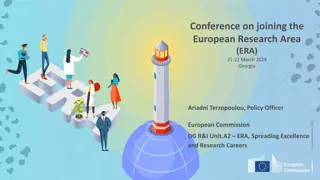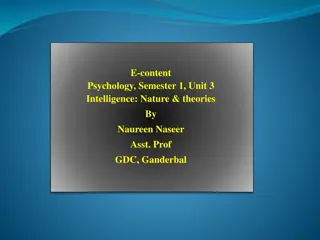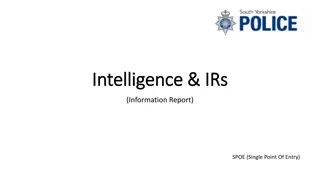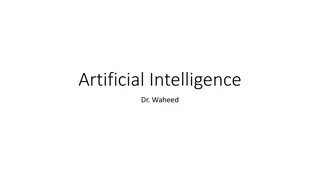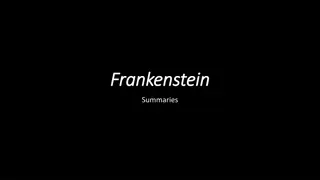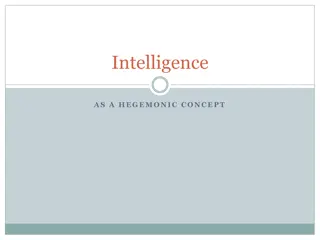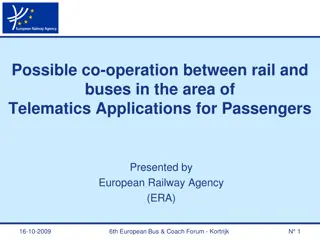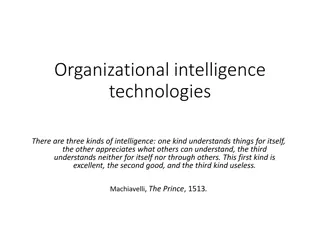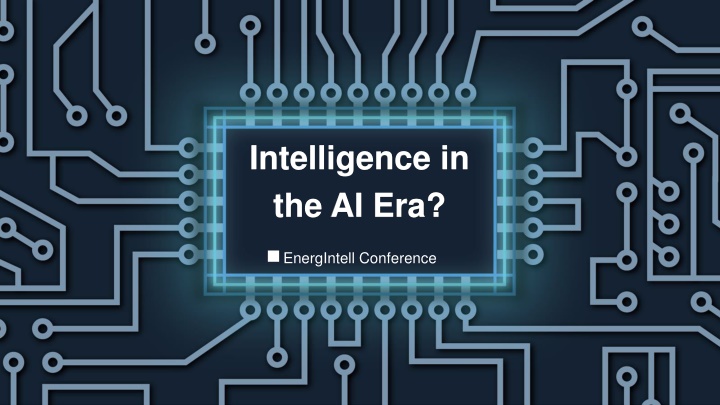
Exploring Artificial Intelligence in the Digital Era
Dive into the world of Artificial Intelligence in the digital space, analyzing benefits, trends, and adoption. Discover how AI technologies reshape traditional intelligence methods and improve efficiency across various sectors, emphasizing the need for regulatory frameworks and continuous updates.
Download Presentation

Please find below an Image/Link to download the presentation.
The content on the website is provided AS IS for your information and personal use only. It may not be sold, licensed, or shared on other websites without obtaining consent from the author. If you encounter any issues during the download, it is possible that the publisher has removed the file from their server.
You are allowed to download the files provided on this website for personal or commercial use, subject to the condition that they are used lawfully. All files are the property of their respective owners.
The content on the website is provided AS IS for your information and personal use only. It may not be sold, licensed, or shared on other websites without obtaining consent from the author.
E N D
Presentation Transcript
Intelligence in the AI Era? EnergIntell Conference
CONTENT Introduction Objective and Motivation Hypothesis, Methodology Results 1 Definitions Artificial Intelligence, Digital twin 2 Findings Data collection Statistical analysis Legislative framework 3 4 Conclusions
01 Introduction To provide a data collections about how Artificial Intelligence is used in current digital space To identify the main benefits which came form its usage To establish trends of using AI in the next future The adoption of usages of the AI in Intelligence
01 Introduction Objective and Motivation, Hypothesis, Methodology, Results There are specific AI technologies for improving the efficiency in different sectors of activities The data can be improved by using AI technologies but need a regulathory work frame The AI technologies dedicated need to be permanently updated AI technology reshape the traditional ways of Intelligence?
01 Introduction Objective and Motivation, Hypothesis, Methodology, Results The time allocated for different tasks can be reduced by implementing AI technologies AI technologies integrated IT&C solutions are tools that can assure a safe environment for economic and social growth Using AI can significantly reduce the economic losses of government and private sector AI technology need constat update and supervision
02 Definitions Artificial Intelligence, Digital twin Artificial Intelligence Artificial Intelligence is a computer programme that is capable to simulate human mind way of thinking in taking decisions Digital Twin Digital twin can be described as a digital version of a specific individual, object, or process created with the scope of improving decisions and simulating real situation
03 Findings Data collection, Statistical analysis, Conlcusions EU enterprises using AI technology 8% 30,4% Large EU enterprises using AI technology Eurostat, data for 2023 Eurostat, data for 2023
03 Findings Data collection, Statistical analysis, Conlcusions suffering ICT incidents22% 92% EU enterprises used at least one ICT security measure EU enterprises Eurostat, data for 2023 Eurostat, data for 2023
03 Findings Data collection, Statistical analysis, Conlcusions The most significant difference in the use of artificial intelligence in companies is registered at the level of large companies, with a rate of 2%, and a smaller dynamic in small and medium companies
03 Findings Data collection, Statistical analysis, Legislative framework Hybrid warfare AI Cyber security driven vs AI Cyberattacks driven AI-generated content and social media amplification Using AI in cybersecurity can significantly reduce the economic losses of government and private sector. The adoption of artificial intelligence in the field of cybersecurity is becoming a necessity both at the government level and at the private sector level, having a direct impact in reducing the number of security incidents as well as in reducing financial or time losses, but also in increasing the confidence of users of computer systems and consumers of online services.
03 Findings Data collection, Statistical analysis, Legislative framework Both the governmental and the private sectors continue to adopt artificial technology within the computer systems, at a rate that can be accelerated in the coming years EU - AI ACT - first regulation on AI The adoption of artificial intelligence, particularly in the field of cybersecurity is supported by existing legal regulations, in a predictable framework that ensures the efficient and transparent use of these technologies. It is necessary to continue and permanently adapt these technologies and legal regulations according to future developments in the demon of cybercrime to ensure a sustainable economic and social development.


